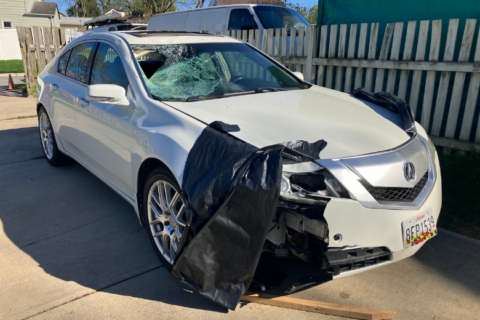FALLS CHURCH, Va. (AP) — A former Coast Guard lieutenant accused by prosecutors of plotting to kill members of Congress to advance a white nationalist agenda asked an appeals court Friday to vacate his guilty plea after a judge ruled that his crimes were linked to terrorism.
Christopher Hasson of Silver Spring, Maryland, pleaded guilty in 2019 to firearms offenses. But at his sentencing hearing, the judge applied a “terrorism enhancement” that resulted in a 13-year prison sentence. Without the terrorism enhancement, sentencing guidelines would have resulted in a term of about four years.
Hasson was never charged under a terrorism statute — many of which are drafted to apply only to international terrorism — and his lawyers say the terrorism enhancement was wrongly applied. They say he never intended to carry out any killings. In court papers, Hasson’s lawyers ask the panel to either vacate Hasson’s guilty plea or order a new sentencing hearing.
Prosecutors say that plotting to kill members of Congress is exactly the type of crime for which a terrorism enhancement should apply. Prosecutor Thomas Windom said decades of precedent exist for applying the terrorism enhancement as the trial judge did, under guidance from the U.S. Sentencing Commission.
But public defender Cullen Macbeth argued that the guidance from the sentencing commission ignores plain language in the law that the terrorism enhancement can only be used when a defendant is convicted of particular crimes, none of which applied to Hasson.
At Friday’s appellate hearing, the three judges — Diana Gribbon Motz, a Clinton appointee; Albert Diaz, an Obama appointee; and Allison Jones Rushing, a Trump appointee — gave little indication of how they may rule.
Hasson was arrested in February 2019 as he went to work at Coast Guard headquarters in Washington. He had nearly 200 pills of Tramodol in his possession. He was charged with possession of a controlled substance, illegal possession of firearms by a drug addict and illegal possession of firearms silencers.
Prosecutors presented evidence that Hasson referred to himself as a longtime white nationalist in a letter he addressed to a neo-Nazi leader. In another letter he wrote he dreamed he would “kill as many people as possible.” He had collected what prosecutors called “an arsenal of death” that included multiple firearms, weapons and survivalist gear. He conducted research on sniper attacks and mass killings carried out by white supremacists and right-wing terrorists. He made a list of targets that included liberal members of Congress and journalists.
A decision on his appeal is expected in the coming weeks.
Copyright © 2024 The Associated Press. All rights reserved. This material may not be published, broadcast, written or redistributed.







